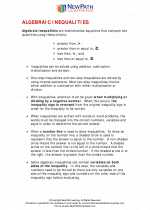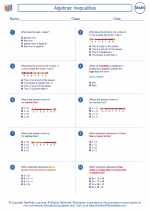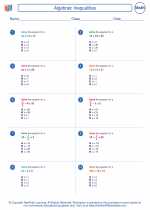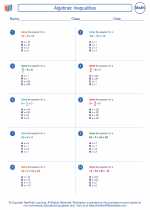Divisibility
Divisibility is the ability of one number to be divided by another number without leaving a remainder. This concept is important in understanding the properties of numbers and is used extensively in arithmetic and algebra.
Divisibility Rules
There are specific rules that can help determine if a number is divisible by another number. Here are the most commonly used divisibility rules:
- Divisibility by 2: A number is divisible by 2 if its last digit is even (0, 2, 4, 6, 8).
- Divisibility by 3: A number is divisible by 3 if the sum of its digits is divisible by 3.
- Divisibility by 4: A number is divisible by 4 if the number formed by its last two digits is divisible by 4.
- Divisibility by 5: A number is divisible by 5 if its last digit is 0 or 5.
- Divisibility by 6: A number is divisible by 6 if it is divisible by both 2 and 3.
- Divisibility by 9: A number is divisible by 9 if the sum of its digits is divisible by 9.
- Divisibility by 10: A number is divisible by 10 if its last digit is 0.
Practice Problems
Now that you understand the divisibility rules, let's practice with some problems:
- Is 648 divisible by 3?
- What is the smallest 3-digit number that is divisible by 9?
- Which of the following numbers is divisible by 4: 362, 448, 521, 706?
Answers
- Is 648 divisible by 3? Yes, because the sum of its digits (6 + 4 + 8) is 18, which is divisible by 3.
- What is the smallest 3-digit number that is divisible by 9? The smallest 3-digit number divisible by 9 is 108.
- Which of the following numbers is divisible by 4: 362, 448, 521, 706? The number 448 is divisible by 4 because the number formed by its last two digits (48) is divisible by 4.
Practice using these divisibility rules with various numbers to strengthen your understanding of this concept!
.◂Math Worksheets and Study Guides Seventh Grade. Algebraic Inequalities
Study Guide Algebraic Inequalities
Algebraic Inequalities  Worksheet/Answer key
Worksheet/Answer key Algebraic Inequalities
Algebraic Inequalities  Worksheet/Answer key
Worksheet/Answer key Algebraic Inequalities
Algebraic Inequalities  Worksheet/Answer key
Worksheet/Answer key Algebraic Inequalities
Algebraic Inequalities 

 Worksheet/Answer key
Worksheet/Answer key
 Worksheet/Answer key
Worksheet/Answer key
 Worksheet/Answer key
Worksheet/Answer key

The resources above cover the following skills:
Algebra (NCTM)
Represent and analyze mathematical situations and structures using algebraic symbols.
Use symbolic algebra to represent situations and to solve problems, especially those that involve linear relationships.